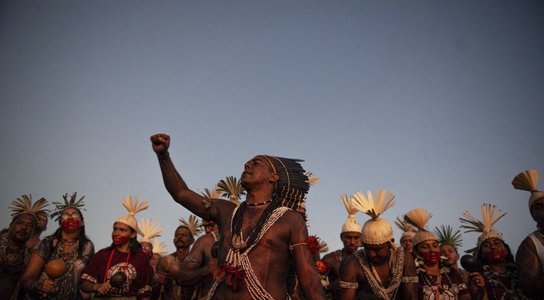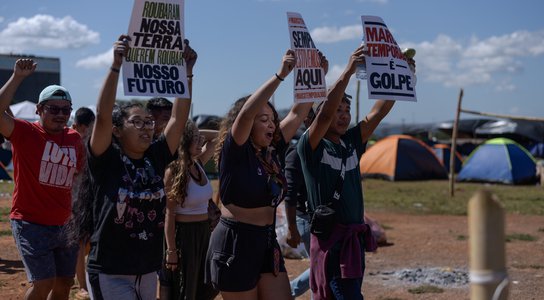European Parliament members consult with Brazilian traditional communities on new law that promises to prevent and address human rights violations and environmental harms.
Brazil’s croplands are a breadbasket for the world, and its forests and grasslands are the world’s lungs, however Brazil’s lands are also ripe with conflict over resources – making it one of the most dangerous places to be a land and environmental defender. Global Witness has documented over 300 defender killings in Brazil between 2012 and 2020. Many of those killed are Indigenous people protecting their livelihoods from unscrupulous business and government interests including from the ever-expanding reach of agribusiness for producing commercial crops like soy. As more land is swallowed, the situation only worsens.
We exposed human rights abuses in our Seeds of Conflict investigation, showing how global traders such as ADM and Bunge, who export soy to Europe, contributed to alleged human rights abuses against a traditional community in the Brazilian Cerrado. These companies purchased from producers who harassed and attacked local communities trying to protect their land. Under international human rights standards, companies should protect these communities instead of contributing to their suffering.
Last week, traditional communities from the Brazilian Cerrado expressed their concerns about the impacts of agribusiness on the environment and on people’s lives to Members of the European Parliament involved in the development of the Corporate Sustainability Due Diligence Directive (CSDDD). This legislation, if passed, would mandate companies trading in Europe to ensure that they don’t negatively impact people and the planet – and would hold them accountable in European courts if they fail to do so. While the draft law still needs to be strengthened to meet its stated intention, it forms a major step towards stopping corporate abuse in countries like Brazil.
The Seeds of Conflict
Our investigation uncovered that ADM and Bunge were purchasing soy from agricultural producers who were trying to claim the land of a traditional community in the Brazilian state of Bahia.
Since the land dispute started, community members have repeatedly reported being intimidated and threatened by security agents hired by the producers, with families from Capão do Modesto at risk of being forcibly removed from their territory. Eviction of the communities would mean the destruction of their ancestral way of life and certain destitution.
To date, both ADM and Bunge have favoured their suppliers’ arguments that the land belongs to them, even though the community has lived in the area for generations and has their rights recognised by the Brazilian Constitution. ADM, who initiated an investigation within their grievance system after our report was published, rapidly concluded that their suppliers’ farms “were being constantly trespassed by (...) local community members” and that “no evidence of violent acts/harassment were found”.
It is not clear what action, if any, Bunge has taken, as it has not yet found time to speak with Global Witness since our November 2021 report. Bunge does not have a public grievance log for its soy business and has to date highlighted court rulings that favoured its suppliers in its response to the case.
The CSDDD aims to implement mandatory due diligence rules for companies – who would be pushed to assess their risks to human and environmental rights, prevent them, and provide remedy in cases
where they have already caused harm. Communities suffering from corporate abuse could bring wrongdoers to European courts rather than relying on judiciaries in third countries. In other words, when this legislation comes to effect, ADM and Bunge will no longer be able to hide behind their voluntary policies and will be legally accountable for any contribution to human rights violations in their supply chains.
Sowing hope: Listening to traditional communities
On the 26th August 2022, a delegation of EU Parliamentarians met representatives from the AATR (Associação de Advogados/as de Trabalhadores/as Rurais), an association of lawyers who have tirelessly supported the Capão do Modesto community since the onset of this conflict, as well as members of other traditional communities from the Brazilian Cerrado affected by the expansion of agribusiness and land grabbing. AATR members highlighted the negative impacts of agribusiness on the environment and on local communities in Brazil, and emphasized the CSDDD’s potential in helping protect affected communities.
Maurício Correia, head of the AATR, explained during the meeting how the crisis faced by the Capão do Modesto community was not an isolated one. He added: “The advance of the agriculture frontier in the Brazilian Cerrado is one based on land grabbing (of public land and traditional communities’ territories), large scale deforestation, water contamination by pesticides and on the violation of the human rights of local communities, including threats, forced evictions, criminalisation and killings of social leaders. We hope that this new EU directive on due diligence improves traceability in supply chains to prevent, mitigate and remediate these violations”.
Having heard from affected communities first-hand, MEP Iratxe Pérez noted that the new due diligence legislation intends to help strengthen corporate accountability through European channels and help keep affected communities safe. She added that cases like the ones AATR presented are a demonstration of the harms they would like to prevent from happening; for MEP Pérez, it’s important to recognise the real human sufferings caused by irresponsible corporate actions. Community members were invited to visit the European Parliament in Brussels to continue discussing the issues in Cerrado, which often receive less attention than those in the Amazonian region.
While the CSDDD is a landmark initiative to promote corporate accountability, it currently includes loopholes and shortcomings that could allow business to continue as usual, with little real change. It must therefore be strengthened to be fit for purpose. Among other issues, the published draft does not recognise land and environmental defenders, including Indigenous peoples, as vital actors with whom companies need to engage continuously – with the draft merely stating that they should be consulted only ''where relevant''. With growing violence against defenders, it is essential that the legislation mandate meaningful engagement with impacted and potentially impacted communities as part of a company’s ongoing due diligence processes.
Further,
agribusiness traders such as ADM and Bunge should suspend their soy
purchases from the suppliers in conflict with the Capão do Modesto
community while there are unanswered questions around land tenure and
until they have fully compensated the community for the harms they have
suffered as a consequence of the land dispute. This positive step would
demonstrate that they are willing to reduce exposure to human rights
abuses in their supply chains, in line with the CSDDD’s principles.
Author
-
Aurelie Skrobik
Campaigner, Corporate Accountability


